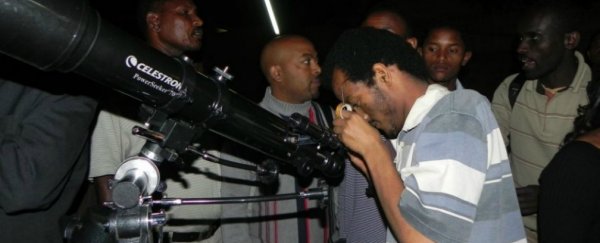Ethiopia has built a privately funded astronomical observatory, taking the first step towards creating a fully fledged national space agency. With the US$3 million investment, the East African country joins a handful of other African nations, including Nigeria, South Africa, and Egypt, that have their own space programs, and the government hopes the move will boost the local agriculture and communication industries.
As you might imagine, the decision has attracted criticism due to the fact that Ethiopia, the second most populous country in Africa, is also battling with malnourishment and poverty among its people. But so far no government money or international aid has been used to establish the observatory, which was built by the Ethiopian Space Science Society (ESSS) - a body funded by Ethiopian-Saudi business tycoon Mohammed Alamoudi.
The observatory opened a few months ago on top of the 3,200-metre-tall Mount Entoto, and includes two large telescopes and a spectrograph that measures wavelengths of electromagnetic radiation. The goal is to provide a facility in which to train local astronomers, scientists, and engineers, and establish a local culture of innovation.
"Science is part of any development cycle. Without science and technology, nothing can be achieved," Abinet Ezra, ESSS communications director, told AFP. "Our main priority is to inspire the young generation to be involved in science and technology."
Now the Ethiopian government has plans to expand the program further and establish an official national space agency in the country. The next step will be to build a far more powerful observatory in the isolated mountains around Lalibela to the north. And engineers at Ethiopia's Institute of Technology also have plans to test the first Ethiopian rocket; the goal is to put an Ethiopian satellite in orbit around Earth within the next five years.
"We are using space applications in everyday activities, for mobile phones, weather - space applications are fundamental," said Kelali Adhana, the International Astronomical Union chief for East Africa, who is based in Ethiopia. "We cannot postpone it, otherwise we allow ourselves to live in poverty."
The argument that countries shouldn't be 'wasting' money on space exploration isn't a new one - for decades people have been complaining that NASA is a waste of funding and, more recently, India and Pakistan have been criticised for their extremely cheap and successful space missions.
So why should we spend money on space when we still have mouths to feed here on Earth? That question assumes two things: that space exploration directly takes money away from fighting poverty; and that space research does nothing to help fight poverty. And both simply aren't true.
For starters, the amount that countries spend on astronomy is minuscule in comparison to the amount that's spent on things such as war, tobacco and fireworks. Not to mention corruption and tax breaks for the wealthy. The amount that India spent on the Indian Space Research Organisation in 2014 was just US$1.1 billion, less than 1 percent of their annual GDP - a similar amount that the US assigns to NASA each year.
Importantly, that investment brings back some pretty significant returns. Not taking into account all of the inventions and intellectual property that come from space exploration, there's also the jobs it creates, and the wealth of knowledge it provides access to.
Just consider where we'd be without weather forecasting, GPS technology, and satellite TV. Satellites tell farmers where to plant crops, which can help boost agriculture, and open up access to remote medical attention and education - factors that research has shown are integral to ending poverty.
"Being poor is not a boundary to start this programme," Solomon Belay, director of the new observatory and a professor of astrophysics, told AFP. "Engineering and sciences are important to transform our agriculture into industry."
But he added that the country isn't getting too ambitious just yet, with the focus on space research that can directly help residents. "We are in no hurry to go to deep space," he said.
